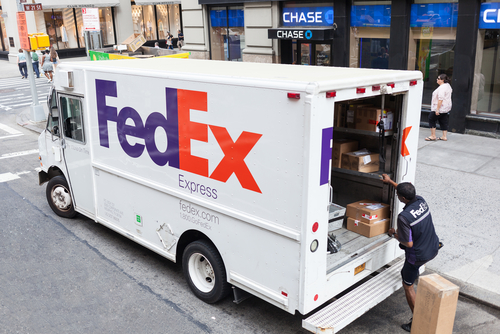|
|
The economic ups and downs of global shipper FedEx are seen as harbingers of the world’s economic future because the shipper carries almost every kind of product—and that future is not looking good.
Last week, FedEx announced it would stop hiring, close about 90 offices, cut its number of flights, and mothball aircraft because worldwide demand for shipping has fallen sharply.
The company also announced its financial performance for the three months ending 31 August, posting revenue $500 million lower than it had forecast and profits just half of what analysts had expected.
FedEx cited “global volume softness” that “accelerated” during the period’s final weeks, the company said, as shoppers have switched from buying goods online to spending more on services and entertainment.
FedEx Ground, the division handling mostly e-commerce deliveries in the U.S., saw revenues fall $300 million short of the company’s prediction.
Because it expects the world’s economy to weaken further now through November, FedEx also cut its budget for capital expenditures and withdrew its financial guidance for the rest of this year and all of 2023.
The company is “aggressively accelerating” its efforts to cut costs and boost productivity, CEO Raj Subramaniam said in a 15 September CNBC interview.
The news tanked FedEx’s stock at week’s end on 16 September. The share price lost about 20 percent, its worst day since the company went public in 1978.
FedEx’s fates also sent fears rippling through the logistics industry.
UPS’s stock fell 4.5 percent and the share price of XLO Logistics stumbled 4.7 percent. Germany’s Deutsche Post AG’s stock price surrendered 4.6 percent and the U.K.’s Royal Mail PLC was down 8.1 percent.
Shares of major cardboard box makers International Paper Co., Packaging Corp. of America, and Westrock all were lower by at least 11 percent.
Railroads CSX, Norfolk Southern, and Union Pacific also all lost share value even though a national rail strike had been averted the day before.
FedEx and rival UPS have raised prices to offset lower volumes.
“It’s going to be hard” for the companies “to make up the volumes for the rest of the year,” Satish Jindal, president of SJ Consulting, told CNBC. Average daily package volume in this year’s peak holiday shipping season will not exceed last year’s, he added.
TRENDPOST: FedEx’s unwillingness to forecast its financial performance through 2023 offers additional evidence that the world’s economy is headed into a recession.
Inflation’s rate may well moderate, but for the rest of this year and into next, consumers will pinch their pennies twice before spending them.
In addition, folks bought incessantly during the COVID era as well as during the recovery. Especially with remote work as the new normal, fewer people need to be accumulating more stuff.
TREND FORECAST: Consumer spending will remain soft into next year. This year’s holiday spending bump will be modest, but smaller than last year’s.

